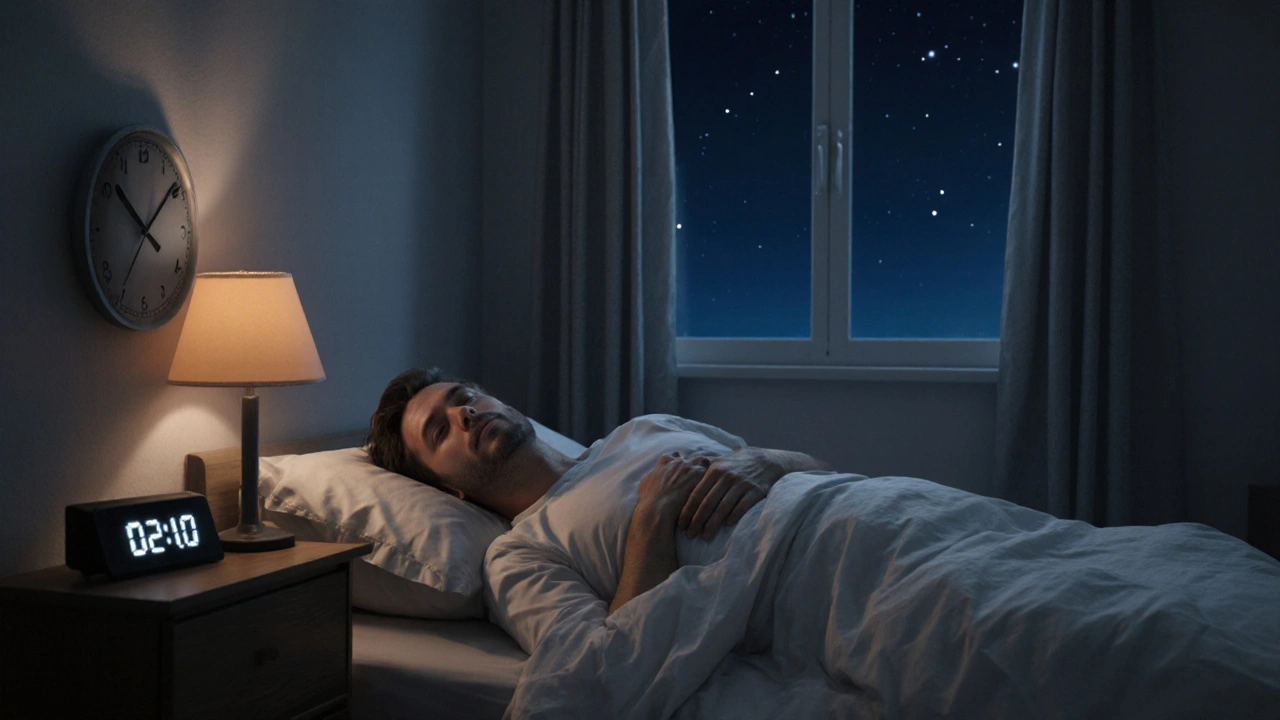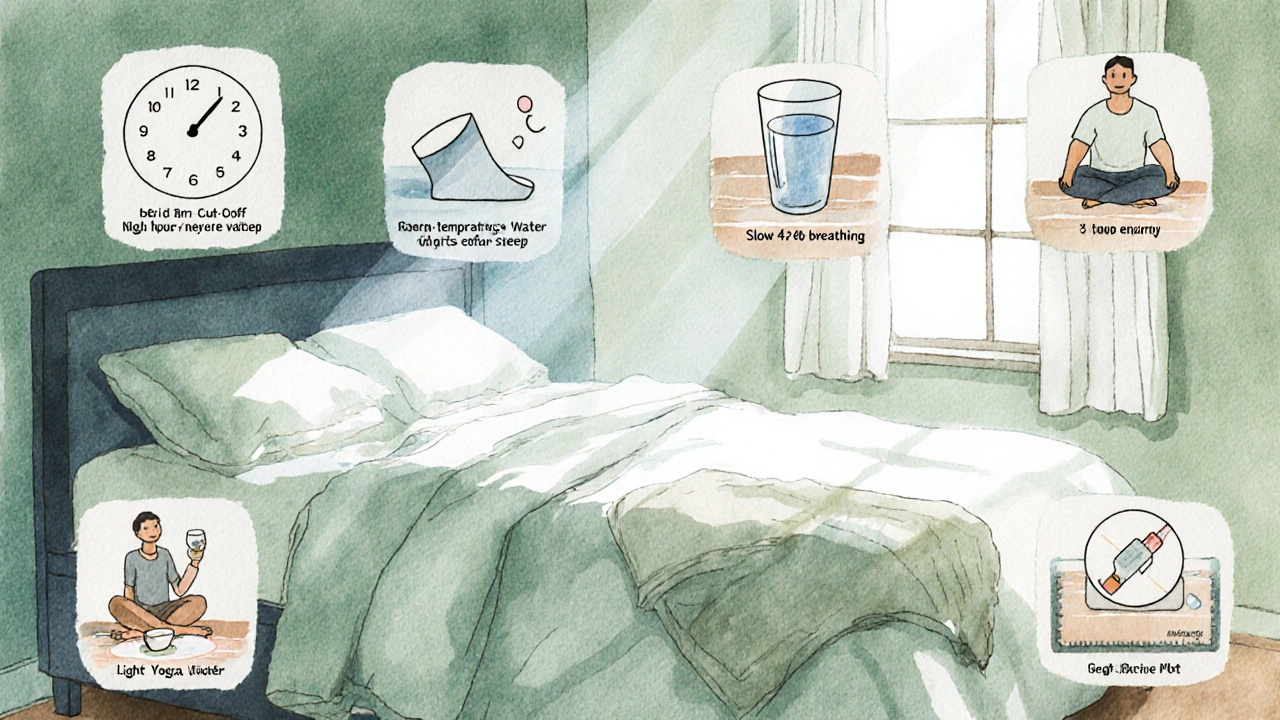Nausea & Sleep: How Vomiting Disrupts Rest and 7 Tips for Better Nighttime Sleep

Nighttime Nausea & Sleep Impact Calculator
Your Personalized Sleep & Nausea Report
Recommended Tips to Improve Sleep Quality
Ever tossed and turned because your stomach felt like a roller coaster? You’re not alone. Nausea is a feeling of unease in the stomach that often precedes vomiting. When it shows up at night, it can turn a normal bedtime into a restless battle. This guide explains why nausea wrecks your sleep, what triggers it after dark, and practical steps you can take tonight to reclaim a calm, uninterrupted rest.
Key Takeaways
- Nausea interrupts the body’s natural sleep hormones, shortening deep sleep.
- Acid reflux, late‑night meals, certain meds, and stress are the top nighttime nausea culprits.
- Simple habits-like elevating the head of the bed and timing fluids-can cut nausea in half.
- When nausea lasts more than a week, comes with severe pain, or causes weight loss, see a clinician.
- Follow the 7‑step bedtime routine below for a smoother, nausea‑free night.
Why Nausea Messes with Your Sleep Cycle
Sleep isn’t just “closed eyes time.” It’s a finely tuned orchestra of hormones, brain waves, and organ functions. Two key players-Melatonin a hormone that signals the body it’s night and the vagus nerve-get hijacked when nausea strikes.
When the stomach lining is irritated, the vagus nerve sends distress signals to the brainstem. Those signals suppress melatonin release, making it harder to fall asleep. At the same time, the body ramps up cortisol (the stress hormone) to protect the gut, which spikes heart rate and keeps you alert. The result? Less deep‑sleep (stage3) and more light‑sleep (stage1), so you wake up feeling groggy even after eight hours in bed.
Common Nighttime Triggers That Spark Nausea
Understanding the usual suspects helps you cut them out before they sabotage your night.
- Acid reflux & GERD - Lying flat lets stomach acid splash up the esophagus, irritating the lining and triggering nausea.
- Heavy or spicy meals after 7p.m. - Digestion slows down, and excess stomach contents increase pressure against the lower esophageal sphincter.
- Alcohol & caffeine - Both relax the sphincter and increase stomach acid production.
- Medications - Some antibiotics, pain relievers, and antidepressants list nausea as a side effect, which often intensifies at night.
- Dehydration - Low fluid levels irritate the stomach lining and make bile more concentrated.
- Stress & anxiety - The brain‑gut axis means worry can cause a churn in the stomach, especially before sleep.

When Nausea Requires Professional Care
Most occasional nausea disappears with simple tweaks, but watch for red flags:
- Symptoms persisting longer than 7days.
- Severe, stabbing abdominal pain.
- Unexplained weight loss or loss of appetite.
- Vomiting blood or material that looks like coffee grounds.
- Fever over 101°F (38.3°C) accompanying nausea.
If any of these appear, schedule an appointment with your primary‑care provider. They may order tests for GERD gastro‑esophageal reflux disease, a chronic form of acid reflux or check for infections, gallstones, or medication interactions.
7‑Step Bedtime Routine to Calm Nausea
- Finish eating at least 3hours before bed. Give the stomach time to empty; a light snack of crackers or banana is okay if you’re hungry.
- Elevate the head of your bed. Raise the mattress 6-8 inches or use a wedge pillow. This uses gravity to keep acid down.
- Hydrate strategically. Sip a glass of room‑temperature water 30minutes before sleep, then stop to avoid a full bladder.
- Practice calming breathing. Inhale for 4seconds, hold 2, exhale for 6. This activates the parasympathetic nervous system, easing the vagus‑induced nausea.
- Limit alcohol & caffeine after noon. Both delay gastric emptying and increase reflux risk.
- Use over‑the‑counter anti‑emetics wisely. Meclizine an antihistamine that reduces motion‑related nausea can help, but consult a pharmacist if you’re on other meds.
- Create a sleep‑friendly environment. Keep the room cool (65‑68°F), dark, and quiet. White‑noise machines lower stress, which indirectly reduces gut upset.
Lifestyle Adjustments for Long‑Term Relief
Beyond bedtime tricks, consider these ongoing habits:
- Regular, balanced meals. Aim for 5‑6 smaller meals daily to avoid big spikes in stomach pressure.
- Mindful eating. Chew slowly, avoid talking while chewing, and stay upright for 30minutes after meals.
- Exercise, but not right before bed. A 30‑minute walk after dinner aids digestion, while vigorous activity within 2hours of sleep raises cortisol.
- Stress‑management tools. Journaling, yoga, or short meditation sessions lower the brain‑gut stress loop.
- Review medications annually. Ask your doctor if any prescribed drugs could be swapped for a nausea‑friendly alternative.
Quick Reference Table
| Tip | Why It Helps | How to Apply |
|---|---|---|
| Elevate Head | Gravity keeps stomach acid down | Use a wedge pillow or raise mattress 6‑8in |
| Finish Eating Early | Allows gastric emptying before lying flat | Stop meals at least 3hours before sleep |
| Limit Caffeine/Alcohol | Both relax the lower esophageal sphincter | Avoid after 12p.m.; choose herbal teas |
| Hydration Timing | Prevents a full bladder and keeps mucus thin | Sip water 30min before bed, then stop |
| Breathing Exercise | Activates parasympathetic system, soothing gut | 4‑2‑6 inhale‑hold‑exhale pattern for 2min |

Frequently Asked Questions
Can melatonin worsen nausea?
Melatonin itself isn’t known to cause nausea, but some brand‑name supplements include fillers or herbal extracts that might irritate a sensitive stomach. Choose a pure, tablet‑form melatonin if you’re prone to gut upset.
Is it safe to take over‑the‑counter antacids at night?
Yes, antacids like calcium carbonate can neutralize excess acid and reduce reflux‑related nausea. However, avoid taking them within 30minutes of bedtime if they cause a calcium‑induced “acid rebound.”
Why does my nausea feel worse when I lie on my left side?
Lying on the left can increase pressure on the stomach‑esophagus junction, especially if you have a hiatal hernia. Switching to the right side or keeping the torso elevated often eases the sensation.
Should I avoid dairy if I get nausea at night?
For many people, high‑fat dairy can slow gastric emptying and trigger reflux. If you notice a pattern, replace milk with low‑fat alternatives or plant‑based milks after dinner.
How long does it take for lifestyle changes to improve nighttime nausea?
Most people see a reduction within 1-2 weeks of consistent changes. Persistent symptoms beyond a month warrant a medical evaluation.
By tackling the root causes-acid reflux, late meals, stress, and dehydration-you can break the cycle of nausea‑driven sleeplessness. Try the seven‑step routine tonight, track what works, and you’ll soon be back to mornings that feel truly rested.

Jimmy Gammell
October 3, 2025 AT 05:55Been dealing with night‑time nausea for months, and this guide hits a lot of the right notes. 😊
Ellie Haynal
October 7, 2025 AT 05:55I’m honestly outraged that we let such basic habits slip through the cracks! Every night I toss, I feel like the universe is mocking my poor digestive system. The simple advice about elevating the head of the bed could save us from endless misery, yet it’s buried under a sea of jargon. It’s almost a moral failing of modern life to ignore these commonsense steps. If we all just respect our bodies enough to stop eating late, we’d reclaim countless hours of precious sleep. The anguish of waking up feeling queasy is a silent scream that deserves louder attention.
fred warner
October 11, 2025 AT 05:55Let’s keep the momentum going! Small changes like a 30‑minute water sip before bed can make a huge difference. Trust the process, and you’ll notice deeper, more restorative sleep within a week. Stay positive and remember each night is an opportunity to reset.
Veronica Mayfair
October 15, 2025 AT 05:55🌙✨ Your tips are like a night‑time safety net for anyone battling nausea. I especially love the wedge pillow suggestion – it’s a game‑changer! Adding a calming breathing routine right before lights out feels like a mini‑meditation session that soothes both mind and gut. Keep sharing these gems, they’re priceless. 🙌
Rahul Kr
October 19, 2025 AT 05:55I’ve tried the right‑side sleeping trick, and it does reduce the reflux sensation for me.
Anthony Coppedge
October 23, 2025 AT 05:55Indeed, the timing of meals plays a critical role; when you finish eating at least three hours before bedtime, gastric emptying proceeds efficiently, thereby minimizing acid exposure during supine rest. Moreover, maintaining a consistent hydration schedule-sip water 30 minutes prior, then cease-prevents a nocturnal bladder surge that can disturb sleep architecture. It’s also worth noting that a slight elevation of the head, approximately six to eight inches, leverages gravity to keep gastric contents where they belong. Integrating these practices systematically can markedly improve sleep continuity.
Joshua Logronio
October 27, 2025 AT 04:55Funny how big pharma loves keeping us in the dark about simple lifestyle fixes-they profit from chronic meds, not from a wedge pillow. The more we rely on prescription anti‑emetics, the richer the industry gets, while the real solution sits on the nightstand. Stay skeptical, stay informed.
Nicholas Blackburn
October 31, 2025 AT 04:55Your conspiracy rant is nonsense; people who actually suffer from nausea need real advice, not baseless blame games. Stop whining and follow the proven steps-elevate your bed, stop late meals, and you’ll feel better.
Dave Barnes
November 4, 2025 AT 04:55In the grand tapestry of human discomfort, nighttime nausea is but a fleeting shadow, yet it reminds us of the delicate equilibrium between body and mind. When we align our habits with nature’s rhythm, the night transforms from a battlefield into a sanctuary of restoration.
Kai Röder
November 8, 2025 AT 04:55Well expressed, Dave. Your reflection captures the subtle interplay of physiology and philosophy beautifully. Let’s encourage others to adopt these evidence‑based habits while honoring their personal journeys.
Brandi Thompson
November 12, 2025 AT 04:55I have to say that the entire discourse surrounding nighttime nausea is riddled with superficial advice that barely scratches the surface of what truly drives the problem. First, people ignore the fundamental fact that the circadian rhythm governs not only sleep but also gastrointestinal motility and they never bother to sync their eating windows with this rhythm. Second, the industry pushes high‑fat, high‑sugar desserts after dinner under the guise of “comfort food” while conveniently overlooking the acid reflux trigger that follows. Third, there is a blatant disregard for the simple physics of gravity; elevating the head of the bed is an ancient technique that modern society has somehow forgotten. Fourth, excessive caffeine consumption after noon is normalized in our culture despite clear evidence that it prolongs gastric emptying. Fifth, many individuals fail to recognize that stress hormones like cortisol keep the vagus nerve in a constant state of alarm, perpetuating nausea. Sixth, the widespread use of over‑the‑counter antacids without a proper medical evaluation can mask underlying disorders and delay proper treatment. Seventh, the lack of patient education on proper hydration timing means that dehydration becomes a covert culprit in nightly gut upset. Eighth, medication side effects are brushed aside as inevitable, yet a thorough review with a pharmacist can often substitute a drug that provokes nausea with a gentler alternative. Ninth, the neglect of post‑meal upright posture for at least thirty minutes is a glaring oversight in most sleep hygiene checklists. Tenth, the pervasive belief that melatonin supplements are harmless ignores the fact that some formulations contain fillers that irritate a sensitive stomach. Eleventh, social media platforms are flooded with anecdotal “quick fixes” that rarely stand up to scientific scrutiny. Twelfth, clinicians sometimes dismiss persistent nausea as psychosomatic without conducting comprehensive labs, which undermines patient trust. Thirteenth, the cost of prescription anti‑emetics is skyrocketing, creating a financial burden for those who could have benefited from low‑cost lifestyle changes. Fourteenth, the overall narrative fails to address the cultural dietary patterns that predispose certain populations to nocturnal reflux. Finally, if we collectively embraced the straightforward, evidence‑based steps outlined in the article, we could dramatically reduce the prevalence of night‑time nausea and restore genuine, restorative sleep for countless individuals.
Chip Hutchison
November 16, 2025 AT 04:55I hear you, and while the list is exhaustive, the core takeaway is simple: adjust meal timing, elevate the head, and manage stress. Those steps are doable for most people and can make a real difference.